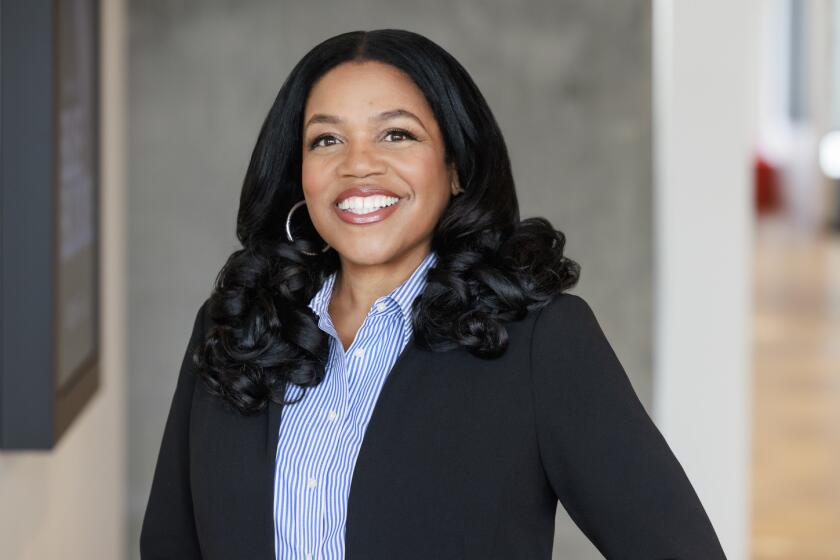Review: PBS’ ‘After Newtown’ programs take on tough issues
“Raising Adam Lanza,” which premieres Tuesday as part of the PBS series “Frontline,” is one of a number of programs the network is airing this week under the banner “After Newtown.” Undertaken in concert with the Hartford Courant, it focuses on Nancy Lanza, the mother of the Sandy Hook Elementary School killer and also his first victim, to try to make a senseless act more sensible.
It fails, of course. There are some nuggets of new information, to be sure, which “Frontline” and the Courant had jealously guarded; reviewers were forbidden to publish these facts before the paper unveiled them in a more detailed print story last Sunday. There are also photographs and videos, “obtained exclusively,” bits of emails sent by Nancy, and a lot of speculation from people who knew her well and less well, bringing some focus to what in this minutely documented day and age remains a surprisingly hazy picture.
The real lesson of the story — unintended though acknowledged, and reflected in different ways by much of the “After Newtown” programming — is that it is impossible to make that picture completely clear. As strong as is our predilection to assign blame, to find the facts that will lead to some cause-and-effect explanation, human life remains stubbornly open to interpretation.
INTERACTIVE: Upcoming 2013 TV shows
It’s in showing that attempt that “Raising Adam Lanza” best succeeds, as it follows Courant reporters Alaine Griffin and Josh Kovner as they make their rounds, sit in strangers’ living rooms, meet with their superiors: “As much as people are saying she was really trying all she could at some point he thought that she wasn’t or she wasn’t doing something that he needed her to do,” editor John Ferraro tells them; but that is a secret no one alive can answer.
Questions of what makes an Adam Lanza are further explored, and not settled, in the “Nova” science special “Mind of a Rampage Killer” (premiering Wednesday), which goes among neuroscientists, behavioral scientists, psychologists, statisticians and blogger Liza Long, whose controversial post on the challenges of raising her own sometimes violent son, called “I Am Adam Lanza’s Mother,” went viral last December. “Unfortunately,” the program admits right off the bat, “there is no simple answer.”
We know that stress can stunt the growing brain; that babies who get physical attention as a rule become better adults; that certain factors make a person more likely to become a mass murderer, but that none of those factors mean that a person will become a mass murderer. Like a Category 5 hurricane, we’re told, rampage killings are “devastating but extremely rare,” and still impossible to accurately predict.
STORY: A roundtable on TV’s future
“The Path to Violence” (also premiering Wednesday) takes a more practical approach, proceeding from the Safe School Initiative, a study by the United States Secret Service that came to the conclusion that Columbine-style school attacks are typically not the result of a sudden psychotic break, but are planned over time and not in secret.
A culture of attention is therefore a better safeguard than security systems and “bulletproof children’s wear and backpacks,” apparently a real thing, and to the extent that putting police in schools works it succeeds not from the raw threat of force but from the creation of community, in which a student might be prompted to share knowledge of a threat with a responsible adult. Many such attacks have already been stopped before they (theoretically) started.
“Guns in America,” which premieres Tuesday before “Raising Adam Lanza,” offers a quick overview — a little bit history and a little bit policy — of our special relationship with firearms, from colonial days to the patenting of the Colt revolver (cheap, portable and easy to conceal) to the founding of the NRA (Civil War vets concerned with civilian gun safety) and on to our present quagmire. Much of it comes down to that conversation-stopper, “identity” — that is, an irrational attachment to a once useful idea. It will remind you that most people who own guns are not dangerous; on the other hand, it left me feeling that “Because I want one” is not a good enough reason to make military-style weapons generally available.
--------------------------------
‘Frontline’
Where: KOCE
When: 10 p.m. Tuesday
Rating: Not rated
PHOTOS, VIDEOS & MORE:
GRAPHIC: Faces to watch in 2013
VIDEO: Winter TV preview
PHOTOS: Best TV of 2012
More to Read
The complete guide to home viewing
Get Screen Gab for everything about the TV shows and streaming movies everyone’s talking about.
You may occasionally receive promotional content from the Los Angeles Times.







